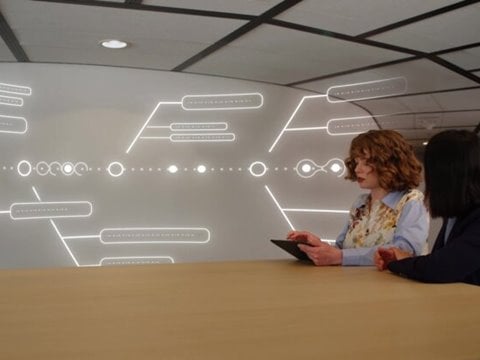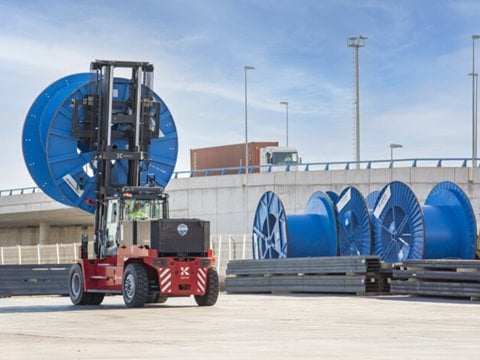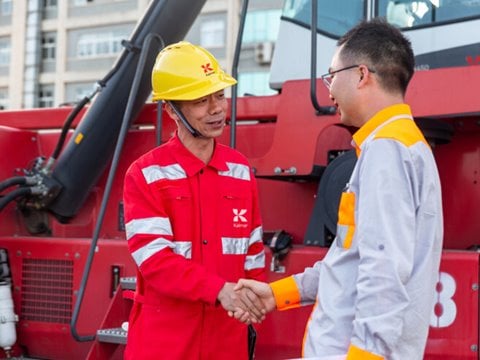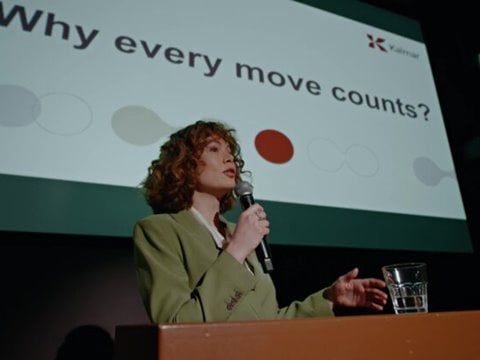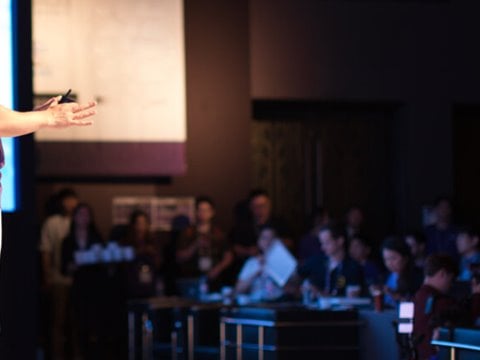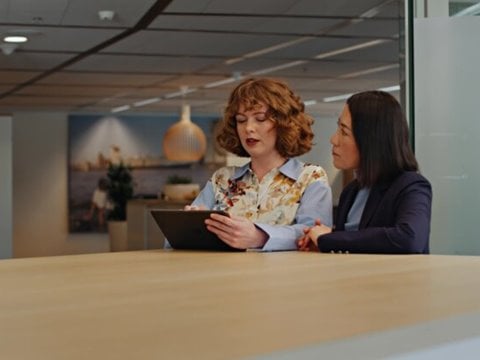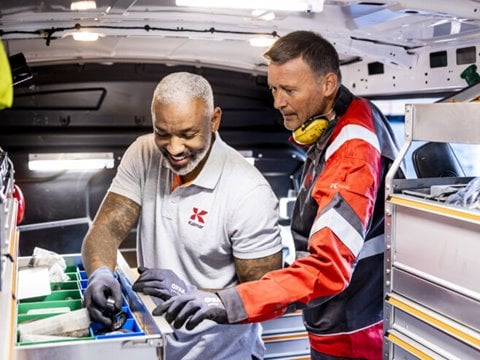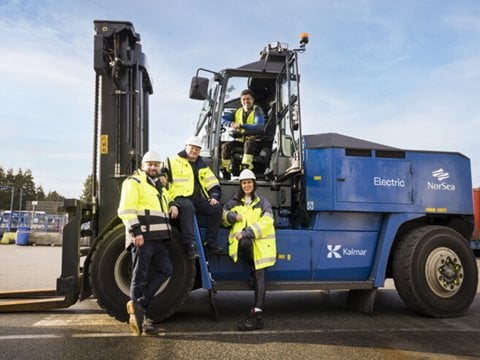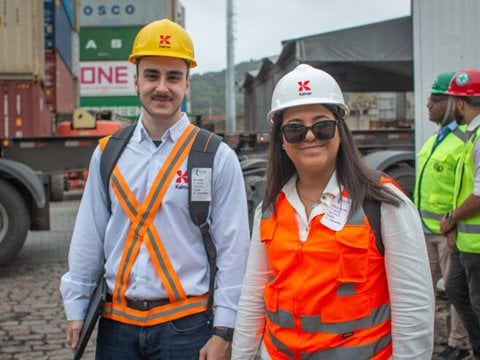FastCharge™ technology outpaces diesel and hybrid solutions in business case analysis of CO2 taxation
Kalmar conducted a business case analysis that compared FastCharge-based shuttle carriers with traditional diesel-electric and hybrid machines at three different levels of expected CO2 taxation. Higher carbon taxation levels will make the investment in FastCharge technology even more compelling than before.
Over the last five years, emission trading and carbon taxation have gained ground rapidly around the world. The percentage of global emissions of greenhouse gases covered by some form of carbon taxation has grown from 12% to 20% between 2014 and 2019. Currently, 46 national and 28 subnational jurisdictions have implemented carbon taxation, with implementation completed or planned in 57 countries around the world.
The pricing of the tax initiatives currently ranges from US$1 to US$127 per ton of CO2, with Sweden holding the highest figure. "In the range of US$40 to US$80 per ton, we find the taxation levels that many experts hold as necessary to reach the targets of the Paris Agreement," says Timo Alho, Vice President, Terminal Design Services, Kalmar. "However, at the moment, most countries adopting CO2 taxation have set their pricing significantly lower, with 51% of initiatives pricing CO2 emissions at under US$10 per ton."
As awareness of the topic increases, the trend is clearly towards increased legislation and pricing of carbon initiatives. "By 2024, we may see over a third of global CO2 emissions being taxed," Alho notes.
Analysing the future
Kalmar FastCharge™ is a cost-efficient, safe and scalable solution that eliminates the need for battery swapping while also cutting emissions. FastCharge shuttle carriers can use opportunity charging at strategically located charging stations, avoiding any disruption to horizontal transport operations.
"CO2 taxation is highly relevant for straddle and shuttle carrier operations," Timo Alho says. "The first full-scale FastCharge deployments are currently being delivered, and the market is waiting for references from the terminals that are first to adopt the technology in full-scale terminal operations."
The economic drivers of port and container terminal electrification include operational cost savings, the financial impact of CO2 taxation, eco-efficiency and lower carbon footprints as core values demanded by customers throughout the entire logistics chain, and government initiatives for subsidising green investments.
For a business case analysis, Kalmar created three different scenarios to analyse the payback time and return on investment of FastCharge technology compared to hybrid and conventional diesel-electric. The analysis was based on carbon taxation at the highest cost level set by Sweden; the mid-range level corresponding to the requirements of the Paris Agreement, and the lower level of taxation initiatives currently being adopted in many jurisdictions.
"Despite the higher capital expenditure of the technology compared to traditional diesel-based machines, current and expected CO2 taxation initiatives will demonstrably increase the financial feasibility of a FastCharge-based operation", Timo Alho says.
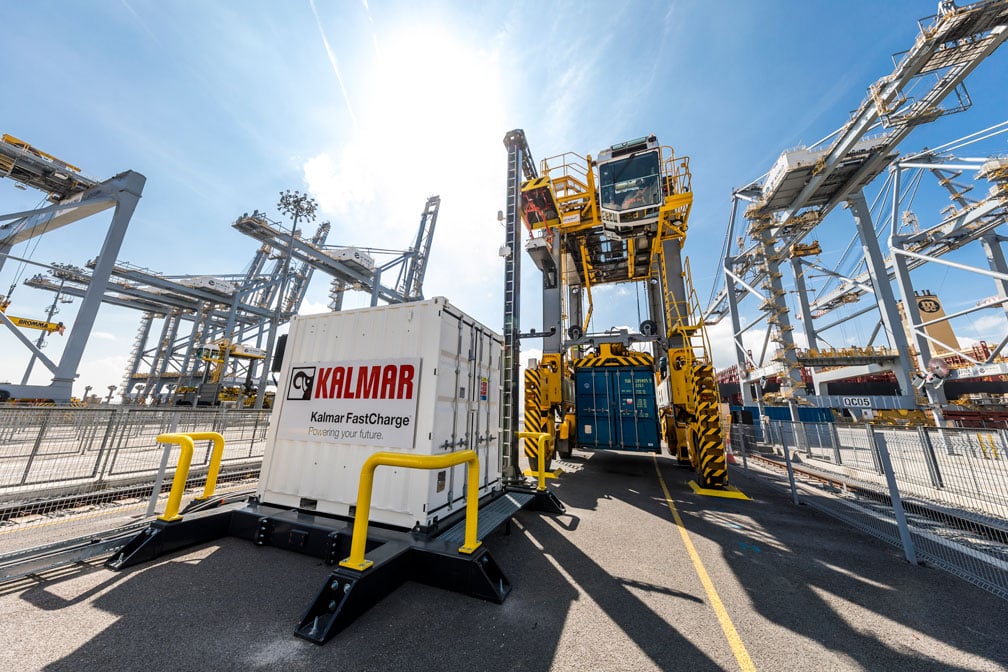
Fast charge, fast payback
For the business case analysis, Kalmar compared a fleet of eight automated shuttle carriers with traditional diesel-electric, diesel-hybrid and fully electric FastCharge operation. For the FastCharge machines, the investment in two charging stations with their required cabling was included in the calculations.
The assumptions in the analysis were as follows:
- CO2 emitted per litre of diesel was 2.68 kg or 0.00268 tons
- Diesel price was assumed to be 1 € per litre
- Electricity was priced at 0,10 € per kWh
- 5,000 operating hours per year per machine
- No annual increase of energy prices (fuel or electricity)
- Fully automated operation (no labour costs to be factored in)
The study results showed that even with the lowest assumed level of carbon taxation (US$10 per ton of CO2), the payback time of the FastCharge investment was 5.4 years when compared to hybrid machines and 5.3 years compared to traditional diesel-electric operation. For the higher levels of taxation (US$60 and US$127 per ton of CO2), the payback time shortened even further, to 4.6 years and 3.9/3.8 years respectively.
"Beyond these timeframes, the FastCharge solution will be more economical due to lower operating costs," Timo Alho notes. "Especially compared to traditional diesel-electric machines, a FastCharge solution will be much more cost-effective over the entire lifetime of the equipment. As carbon taxation gains ground in the upcoming years, these savings may turn out to be even more significant. And obviously, if there are other possible subsidies available for green investments, those will benefit the business case of FastCharge technology as well."
Related articles
Further reading
Subscribe and receive updates in your email
Subscribe